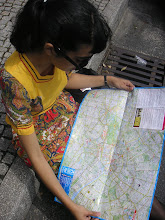Alla eldar elden väntar otåligt på våren och läser om Gramsci, som skriver om de historiska rester och framtidsintuitioner som utgör våra jag. Det passar mig, som har framtiden sparkande i magen. Vem vet vilka spår det förflutna redan har lämnat i mitt barn och vad som ska växa ur våra gamla avlagringar?
For Gramsci, then, "personality is strangely composite: it contains Stone Age elements and principles of a more advanced sience, prejudices from all past phases of history at the local level and intuitions of a future philosophy which will be that of a human race united the world over". Every epoch of history has thus handed down as its legacy to the individuals of the present a set of more or less consistent and compelling doctrines, beliefs and superstitions that survive as traces or "sedimentations" in the human mind. Gramsci sees this essential historicity of the individual as generating a Socratic imperative. Embracing the famous inscription on the Delphi oracle, Gramsci writes, "The starting-point of critical elaboration is the consciousness of what one really is, and is "knowing thyself" as a product of the historical processes to date which has deposited in you an infinity of traces, without leaving an inventory. Such an inventory must therefore be made at the outset".
For Gramsci, then, "personality is strangely composite: it contains Stone Age elements and principles of a more advanced sience, prejudices from all past phases of history at the local level and intuitions of a future philosophy which will be that of a human race united the world over". Every epoch of history has thus handed down as its legacy to the individuals of the present a set of more or less consistent and compelling doctrines, beliefs and superstitions that survive as traces or "sedimentations" in the human mind. Gramsci sees this essential historicity of the individual as generating a Socratic imperative. Embracing the famous inscription on the Delphi oracle, Gramsci writes, "The starting-point of critical elaboration is the consciousness of what one really is, and is "knowing thyself" as a product of the historical processes to date which has deposited in you an infinity of traces, without leaving an inventory. Such an inventory must therefore be made at the outset".
